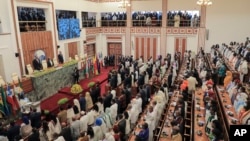Somalia changed its constitution Saturday during a parliamentary vote that, among other things, gives the country’s president the power to appoint and dismiss a prime minister.
After weeks of intense debate, Somalia's bicameral federal parliament approved amendments to the first four chapters in the country's provisional constitution.
In a joint session in Mogadishu, lawmakers voted on each chapter individually before casting votes on the overall amendments proposed by the Independent Constitutional Review and Implementation Commission, or ICRIC.
The speaker of the Lower House, Sheikh Adan Mohamed Nur Madobe, announced a significant majority of members were in favor of amending the constitution.
“A total of 212 members of the Lower House and 42 members of the Upper House supported the amendments, with no abstentions or rejections. Therefore, the amendment has been approved with a unanimous vote,” said Madobe.
Hussein Idow, chairperson of the Constitutional Review Committee, said that three proposed provisions in a draft related to religion would get further review.
“This decision of the postponement of the religion provisions aims to ensure that these provisions align with the principles and values of the Somali people,” he said.
“This provisional constitution has been under review for nearly a decade. From 2012, three parliaments have tried to amend it, but the efforts to finalize the review gained momentum in late 2023. Thanks to the 11th parliament of Somalia for daring to conduct the amendment,” said Idow.
President and prime minister
One key provision in the approved draft establishes that Somalia will have a president and a prime minister. The president will hold the authority to appoint and remove the prime minister from office, an amendment that replaces the previous requirement for the prime minister to obtain a vote of confidence from parliament and allowing more flexibility in the executive branch.
Somalia’s politics are characterized by disputes among Somali presidents and prime ministers, which stem from a complex political landscape that has been shaped by historical, regional, clan-based and ideological factors.
Since the establishment of the office of president in 1960, there have been nine official presidents in Somalia. The last four presidents, including the current president in his first term, have fired a prime minister with the help of parliament.
One key aspect of the disputes revolves around the distribution of power and resources among different clans and regions within Somalia.
According to constitutional experts, the power struggle between the two top offices has always been sparked by the way their roles are designated in the constitution.
Among the proposed constitution amendments was a provision that would have turned Somalia into a system of government in which the president is both head of state and head of government, and the ceremonial duties are delegated to a vice president. During review the parliament removed that provision.
Multi-party system
The amended constitution sets the term of office for government constitutional bodies at five years and refers to regional state presidents as leaders.
It also establishes the presence of three political parties in the country, promoting a multi-party system.
Some political stakeholders, including former Somali Presidents Mohamed Abdullahi Farmaajo and Sharif Sheikh Ahmed, as well as Puntland state leaders, strongly opposed that amendment.
They expressed concerns about the lack of consensus among political actors regarding the changes.
In a separate statement released Saturday, a group of influential politicians, including former prime ministers Hassan Ali Khaire and Omar Abdirashid Ali Sharmarke, have vehemently criticized President Hassan Sheikh Mohamud for being responsible for the approval of the amendment.
“The president has led the nation to a dark path, turmoil, political uncertainty and jeopardized the state building efforts by pushing the parliament to approve controversial provisions in the constitution,” said the statement.
In February, the ICRIC submitted suggested amendments to parliament, focusing on the first four chapters. Those amendments cover the age of maturity for girls and the criminalization of female genital mutilation. The approved amendments establish the age of maturity at 15 and the age for responsibility at 18 — suggesting that everyone under 18 should remain protected by juvenile justice standards.
But rights groups say this would risk reinforcing existing traditional norms, which can force girls to marry at the age of 15.
On Friday, Human Rights Watch warned that the constitutional proposal in its current form puts children at risk.
“It would place girls in particular at greater risk of child marriage, which affects their health, notably reproductive health, their access to education and their protection from other forms of abuse,” Human Rights Watch said.
“Somalia’s parliament should resist efforts to weaken constitutional protections for children, especially girls,” said Laetitia Bader, deputy Africa director at Human Rights Watch. “Somalia’s donors should press the government to carry through on its claims that it is taking significant steps to meet its international human rights commitments.”




